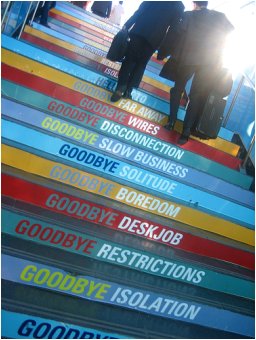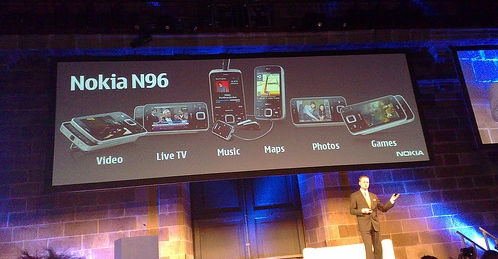 As the Mobile World Congress draws to a
close, a lot of people are going to be wondering where the big advances were;
the big story; the something stunning that will change the mobile phone
landscape for the rest of the year, keep interest high and drive sales as the
world teeters on the brink of a recession?
As the Mobile World Congress draws to a
close, a lot of people are going to be wondering where the big advances were;
the big story; the something stunning that will change the mobile phone
landscape for the rest of the year, keep interest high and drive sales as the
world teeters on the brink of a recession?
And a lot of them will be casting an eye
back to January 2007 and the announcement of the Apple iPhone and wondering why
nobody has reacted to it? It's not because they want to send Steve Jobs to Coventry and not draw any
attention to areas where the iPhone is strong (e.g. the user interface), but
because the product development and associated lead times are incredibly long
in the smartphone market. Even a planned move into touch screens such as the
S60 touch initiative will need at least 18-24 months. I'm pretty sure that
these were being worked on as the iPhone was announced (though you can bet that a lot was reevaluated in the light of iPhone news), and there were hints at
the Go:Play event in September last year.
This is why this years crop of phones from
the smartphone players were by and large iterative devices. They were all a
little bit better than their predecessors - a little bit more memory, a little
bit more camera, a little bit more software and services, and a little less
battery power (harumph) - and in some cases that's enough. There's already a definite
line forming between people champing at the bit for the N96, and those that are
thinking they'll stick with an N95 [8GB] for a little longer.
Looking down the major Symbian players,
Nokia gave us four devices, all of which can be regarded as ‘Model X plus 1,'
the N95/N96 as above; the N78 is what the N73 needs to be for a modern device;
and your 6210 and 6220 slot nicely into the mid-tier consumer market. The
only surprise was the lack of any updated Exx enterprise devices - maybe these
will have to wait for the more busines- focussed CEbit or CTIA Wireless shows at the end
of next month. Sony Ericsson seem to have taken a
backwards step (or woken up and smelt the coffee) with the G700 and G900
devices - the big news is they've added a d-pad to the hardware interface -
something that they've been resisting for years and something we've been looking for in every review of recent UIQ-powered devices.
Sony Ericsson seem to have taken a
backwards step (or woken up and smelt the coffee) with the G700 and G900
devices - the big news is they've added a d-pad to the hardware interface -
something that they've been resisting for years and something we've been looking for in every review of recent UIQ-powered devices.
Samsung and LG showed off new S60 designs,
and at some point we'll see these in the hands of the public. Till then they
still appear to be research products, put out to limited marketplaces to learn
more about the smartphone space via tens of thousands of users.
And Motorola are in the middle of deciding
if they really want to be in the market at all, it seems.
Which means that all the funky stuff, all
the revolutionary, reactionary stuff that was on the drawing boards, is either
still there, or in small mock-up devices. The most visible of these, the new
touch and sensor technology on top of S60, isn't scheduled to be around on devices till late in 2008; and
you have to assume that this will form a device announcement at the end of Q3 for a device
to physically debut in shops in 2009...
So the Mobile World Congress in 2009 is
going to be when we're going to see the bang-wow new concept stuff. This year
was almost a placeholder to a certain extent. Everything continues to run
smoothly, we're all moving forward... but Barcelona
next year? Just you wait.
Of course by then we might have seen a new Apple
iPhone the month before at MacWorld 2009, but hey, "that's amore!"
Ewan Spence, 13 Feb 2008
